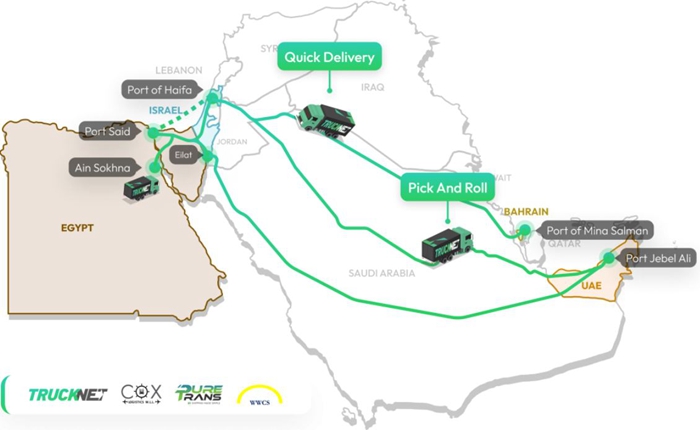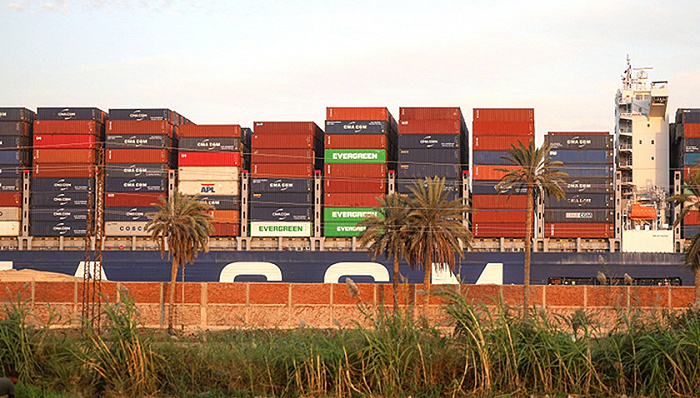Both the multiple rounds of airstrikes by the US military on the Yemeni Houthi armed stronghold and the strikes against Iraq, Syria, and Iran have failed to prevent the Houthi armed forces from continuing to counterattack merchant ships in the Red Sea.

On February 6, 2024, two commercial ships were hit by drones in the southern part of the Red Sea, with one cargo ship slightly damaged. Just last weekend, the United States and the United Kingdom mobilized a new round of airstrikes against 36 armed groups in Yemen.
As the Red Sea continues to hit, Israeli shipping companies have launched new land freight channels, completely bypassing the Red Sea and transporting goods from the United Arab Emirates and Bahrain to Israel, Egypt, and other countries.
Trucknet Enterprise, the pioneering digital freight company in Israel, officially signed an agreement last month with PureTrans, a land freight company from the United Arab Emirates, Cox Logistics from Bahrain, and WWCS, an Egyptian logistics company, to connect new land freight routes in the Middle East.
Trucknet CEO Hanan Friedman announced earlier this month that the company had started shipping food, chemicals, plastics, and electronic products by land from ports in the United Arab Emirates and Bahrain to Israel and Egypt, and related products were then transported from Israel and Egypt to Europe.
Friedman leaked that the company is currently carrying goods from India, Thailand, South Korea, and China, and reverse shipments to Asia also use the same route.
This new road starts from the port of Jebel Ali in Dubai, United Arab Emirates and the port of Mina Sulman in Bahrain, crosses Saudi Arabia, joins Jordan, and then travels to Israel and Egypt respectively from Jordan. Last December, 10 trucks stopped trial operation along a new road from the United Arab Emirates.
According to Trucknet, it only takes 4 days for the goods to be unloaded and shipped from Jebel Ali Port in the United Arab Emirates, and transported by land to the northern port city of Haifa in Israel. At present, container ships traveling from the United Arab Emirates to Haifa, Israel need to detour through the Cape of Good Hope in South Africa, with a flight time of about two weeks.
In terms of price, using land routes will be 15% to 20% more expensive than conservative shipping, but it will be less expensive than using a cargo ship to bypass the Cape of Good Hope. Friedman stated that with the increase in business operations and empty return trucks for goods transported from Israel in the opposite direction to the United Arab Emirates and Bahrain, freight rates will decrease.
The biggest weakness of this new land transportation line lies in its transportation capacity, as there is a huge gap in the transportation capacity between trucks and cargo ships. In addition, existing infrastructure is also a limiting prerequisite. The land ports of Jordan and Israel, as well as the Sheikh Hussein Bridge over the Jordan River, can only accommodate up to 350 heavy trucks per day.
The political changes in the Middle East region have also posed potential risks to land transportation. The news of the participation of the land route in the application has triggered protests from the Jordanian public, with protesters accusing the authorities of providing assistance to Israel, which is currently surrounding Gaza.
Last weekend, hundreds of Jordanian people took to the streets to request the closure of the Jordanian authorities’ land passage, shouting that Jordanian merchants should not import vegetables and other goods into Israel. S&P Global also noted that pro Iranian armed groups in Iraq and Syria are still able to mobilize attacks on transport vehicles on the corridor.
The organization believes that due to the recent crackdown by the Houthi armed forces in the Red Sea, which does not pose a threat to the security of the United Arab Emirates and Saudi Arabia, the Gulf Arab States Mutual Assistance Council will not vigorously promote new land routes. But the new channel can supplement the red sea freight delivery.
12% of global shipments and 30% of container shipments pass through the Red Sea, which is also a major transportation hub for kerosene and liquefied natural gas. According to the “port inspection” data constructed by domestic coin funds, as of February 4th, the daily average number of ships passing through the Suez Canal in the northern Red Sea has risen to 37 within 7 days, compared to around 80 in October last year.
As early as 2020, when Israel signed a normalization agreement with Arab countries such as the United Arab Emirates, Israel initiated land connectivity with other countries.
According to Arab media reports, Lebanon has requested to participate in a land connectivity program to expand its vegetable exports to Gulf countries. But Saudi Arabia accused Lebanon of smuggling longevity cream under the guise of transporting vegetables, and suspended the import of vegetables from the country in 2021.
The new land transportation route currently participating in the application is also seen by American media as an attempt at the name of the “India Middle East Europe Economic Corridor” (IMEC). At last year’s G20 summit, seven countries including India, Saudi Arabia, the United Arab Emirates, and Israel signed a memorandum of forgiveness to create IMEC.
According to previous reports from Interface News, the title has lost support from the United States as it competes with “One Wear, One Road”. IMEC aims to connect Europe, the Middle East, and India through railways and sea routes. Jebel Ali Port in the United Arab Emirates and Haifa in Israel are both direct links on the economic corridor. After the outbreak of this round of Palestinian Israeli conflict, the conflict between Arab countries and Israel came to a halt, and the name push hit a wall.
